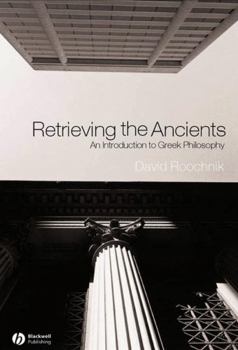Retrieving the Ancients
Select Format
Select Condition 
Book Overview
Retrieving the Ancients tells the story of the first philosophers in the West. A clear and engaging introduction to ancient Greek philosophy. Tells the story of the first philosophers in the West, from Thales to Aristotle. Has a strong sense of narrative drive. Treats the history of ancient Greek philosophy dialectically, as a conversation in which each thinker responds to and moves beyond his predecessors. Argues that the works of the ancients are as valuable today as ever.
Format:Paperback
Language:English
ISBN:1405108622
ISBN13:9781405108621
Release Date:June 2004
Publisher:John Wiley & Sons
Length:248 Pages
Weight:0.85 lbs.
Dimensions:0.8" x 6.0" x 9.1"
Related Subjects
PhilosophyCustomer Reviews
2 ratings
Excellent introduction to Greek philosophy
Published by Thriftbooks.com User , 19 years ago
This is a really good book for those wanting to gain an understanding of the early Western ideas of philosophy. Roochnik guides the reader from the "founders" in the so-called Milesian School all the way through to Aristotle. Having read Plato earlier in life, it was quite interesting to learn how the dialectic that culminated in Platonic and Aristotelian philosophy initially formed in the Pre-Socratic days of Thales, Anaximander, Anaximenes, Heraclitus, Parmenides, and others. I'm especially fascinated with Heraclitus and his idea of flux...the perpetual becoming of all things. This idea is also presented in the Buddhist doctrine of annica, which outlines reality as fundamentally impermanent and indeed, in continuous motion and change. Roochnik goes on to describe the many additional thoughts that grew out of the early naturalist ideas that were themselves responses to the mythic framework that had been at the forefront of Greek culture for centuries. A great deal of the contemplation surrounded notions of the arche, or First Principle, of the world and all creation. The naturalists of the Milesian School looked to the elements - fire, water, air, and earth - to find the foundation of all things, while other philosophers posited an "unmoved mover". The ancient Greek thinkers offer a great view of our earliest inklings of higher thought as a species and the intellectual steps taken to arrive at the epistemological foundation that would ultimately lead to science as we know it today. In my opinion, Retrieving the Ancients is an excellent introduction to this area of study.
profound, lucid, moving
Published by Thriftbooks.com User , 21 years ago
If there's a more graceful, convincing, learned and moving introduction to ancient thought out there, I don't know it. This work is philosophically deep, and yet not cold to the language, style and emotions that moved the various authors (Presocratics, Plato, Aristotle) to philosophize, teach and write. Roochnik lays out the history of ancient thought in four chapters (Presoc., Sophists and Socrates, Plato, and Aristotle). Moreover he refers to contemporary thinkers, and to our near contemporary Nietzsche, from time to time, in order to show the relevance of classical thought to philosophy today. (He also briefly compares The Symposium to Macbeth.) The book culminates in a defence of Aristotle that I find convincing (because, as I see it, Aristotle combines philosophical insight with a interlocking picture of how things hang together, while giving us a robustly commonsensical account of what the human animal is, and can be). But the chapter on Plato is sympathetic and compelling too, if unorthodox -- because it finds a tension in Plato's discussion of the city between the ideal and real (usually expositors find only an emphasis on the ideal). Anyhow, here's a snippet of the writing; Roochnik has just quoted Heraclitus on lice in fragment B56: "Knowledge is like lice. If it is grasped, it is lost. Only if it is missed is it kept. There is a necessary elusiveness in Heraclitus' writing. It is meant to articulate the fluid alterations of temporal beings. It is designed to do justice to the negations of temporal flow. His logos, therefore, must be enigmatic. Were it not, it would be false." (37.) ... "Heraclitean flux seems to shake the ground under our feet. Nothing endures. Such a thought may well cause despair. If nothing endures, then one might conclude that nothing matters. But Heraclitus' own writings do not suggest a trace of despondency." (37) ... See? Clear and smart. I recommend this book to many, even ambitious grade 12 students, or older curious neophyte generalists, as well as to philosophy students.






